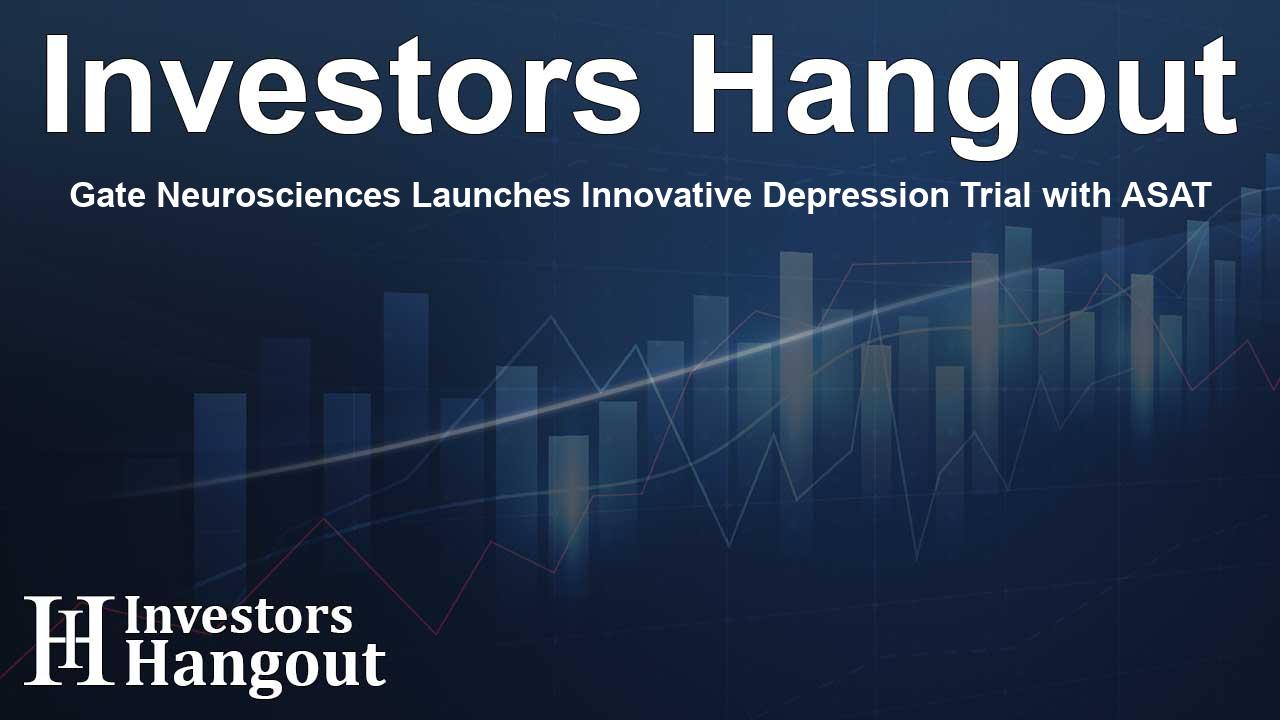Gate Neurosciences Launches Innovative Depression Trial with ASAT

Gate Neurosciences and University Collaboration on Clinical Trial
Gate Neurosciences, a pioneering biotechnology company in synaptic health, is excited to announce the initiation of a Phase 2 clinical study in collaboration with the University of Pittsburgh. This innovative trial aims to explore the combination of apimostinel, a rapid-acting antidepressant, with Pitt's Automated Self-Association Training (ASAT) digital therapeutic.
Understanding the Phase 2 Clinical Study
Led by Dr. Rebecca Price, an esteemed associate professor in psychiatry and psychology at Pitt, this study will evaluate how ASAT can enhance the effects of apimostinel. The ASAT tool employs neurocognitive training to help patients form positive self-associations, potentially prolonging the antidepressant effects of apimostinel. By leveraging a unique 'primed window of brain plasticity,' the researchers believe this combination could provide targeted relief for those experiencing depression.
Insights from Gate Neurosciences
Mike McCully, president and CEO of Gate Neurosciences, shared his enthusiasm for the partnership, emphasizing the potential benefits of combining their precision drug candidates with ASAT. "Our approach focuses on rapidly improving synaptic function, which is critical in addressing various mental health and cognitive disorders," he explained. This collaboration presents an exciting opportunity to expand the treatment benefits of apimostinel.
The Role of ASAT in Enhancing Treatment
Dr. Price’s previous research involved a randomized clinical trial that assessed a similar treatment regimen with ketamine and ASAT, yielding promising results. This past trial showed that a single session of ketamine combined with ASAT exercises could significantly extend the positive effects on depression for months longer than typical treatments. The goal here is to replicate and build upon that success with apimostinel, an important advancement in mental health therapeutics.
Safety and Efficacy of Apimostinel
Apimostinel is a second-generation NMDA receptor positive allosteric modulator currently being developed for acute psychiatric conditions. Prior studies indicated that apimostinel not only produced rapid antidepressant effects but was also well-tolerated by patients. The latest Phase 1 biomarker study has provided encouraging evidence of its potency, showing significant activation of the NMDA receptor pathway, a crucial element in mental health recovery.
Future Outlook for Mental Health Treatments
The collaboration between Gate Neurosciences and the University of Pittsburgh aims not just to develop effective treatments but also to break new ground in how we understand and address mental health challenges. Dr. Price expressed her eagerness to explore ASAT's capability alongside apimostinel. "This partnership is set to yield insights that could reshape treatments for psychiatric disorders," she stated.
Gate Neurosciences' Commitment to Innovation
Gate Neurosciences stands at the forefront of advancing next-generation precision treatments for mental health conditions. The company is leveraging extensive clinical data and innovative approaches to refine its pipeline of clinical programs. This commitment to improving patient outcomes is reflected in their ongoing research and collaborations.
Frequently Asked Questions
What is the purpose of the Phase 2 trial?
The Phase 2 trial aims to assess the effectiveness of apimostinel combined with the ASAT digital therapeutic to extend antidepressant effects.
Who is leading the clinical study?
The study is being led by Dr. Rebecca Price, an associate professor at the University of Pittsburgh.
How does ASAT work?
ASAT utilizes neurocognitive training to help patients form positive self-associations, which may extend the effects of treatments like apimostinel.
What makes apimostinel unique?
Apimostinel is a second-generation NMDA receptor PAM that has shown rapid and lasting antidepressant effects while exhibiting superior safety compared to other treatments like ketamine.
What is Gate Neurosciences’ focus?
Gate Neurosciences aims to develop advanced, precision treatments for mental health, focusing on enhancing synaptic function to address neuropsychiatric disorders.
About Investors Hangout
Investors Hangout is a leading online stock forum for financial discussion and learning, offering a wide range of free tools and resources. It draws in traders of all levels, who exchange market knowledge, investigate trading tactics, and keep an eye on industry developments in real time. Featuring financial articles, stock message boards, quotes, charts, company profiles, and live news updates. Through cooperative learning and a wealth of informational resources, it helps users from novices creating their first portfolios to experts honing their techniques. Join Investors Hangout today: https://investorshangout.com/
Disclaimer: The content of this article is solely for general informational purposes only; it does not represent legal, financial, or investment advice. Investors Hangout does not offer financial advice; the author is not a licensed financial advisor. Consult a qualified advisor before making any financial or investment decisions based on this article. The author's interpretation of publicly available data shapes the opinions presented here; as a result, they should not be taken as advice to purchase, sell, or hold any securities mentioned or any other investments. The author does not guarantee the accuracy, completeness, or timeliness of any material, providing it "as is." Information and market conditions may change; past performance is not indicative of future outcomes. If any of the material offered here is inaccurate, please contact us for corrections.